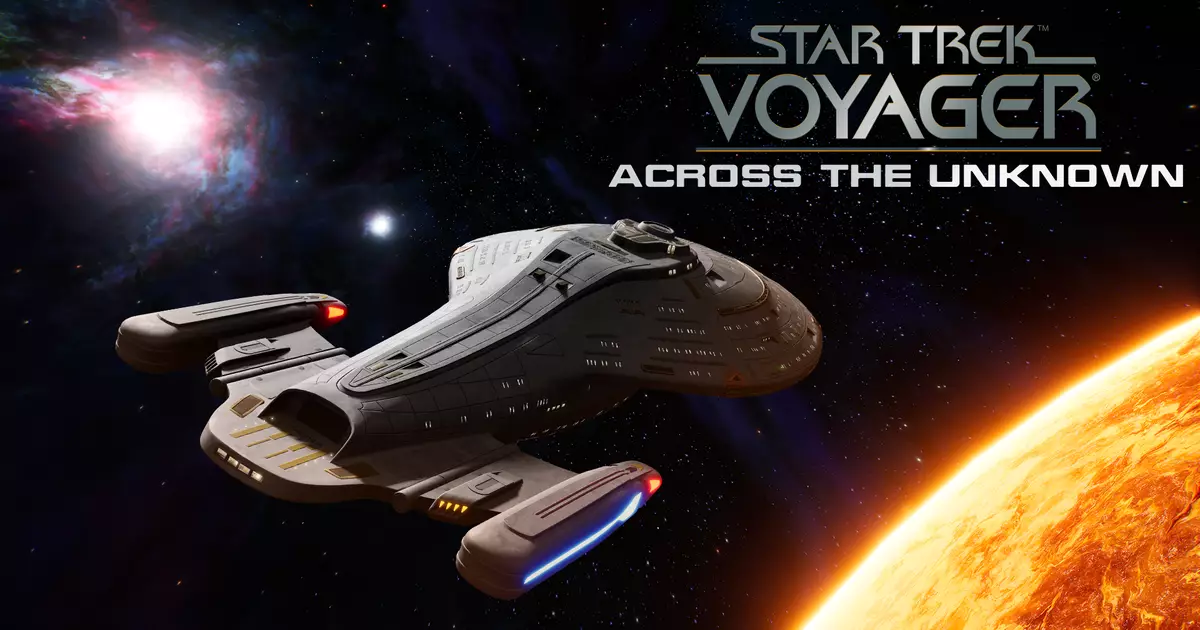Star Trek fans, prepare yourselves for a transformative journey that promises to deepen your connection with the iconic starship Voyager. With the announcement of *Star Trek: Voyager – Across the Unknown*, fans are invited to step beyond the familiar television episodes and immerse themselves in a new form of storytelling—an intricately crafted survival strategy game that seeks to reframe the Voyager saga through player agency. This title isn’t merely a retread; it’s a daring attempt to blend familiar characters, compelling choices, and innovative gameplay mechanics into an experience that respects the essence of Star Trek while pushing its boundaries.
The developers, gameXcite, have embarked on an ambitious path, aiming to recreate the challenging environment of the Delta Quadrant with a strategic edge. At its core, the game aspires to evoke the feeling of command—managing systems, overseeing crew members, and making decisions that could alter the course of their journey. This approach aligns well with the core values of Star Trek: exploration, diplomacy, and moral complexity. Yet, it also confronts fans with the realism of leadership—sometimes negotiating, sometimes fighting, and occasionally, taking calculated risks that could result in unforeseen consequences.
What truly sets this game apart is its commitment to storytelling within a strategic framework. The inclusion of roguelite elements signifies that every playthrough can diverge dramatically, emphasizing the importance of adaptability and the weight of choices. Whether you choose to pursue diplomacy or rely on firepower, the game seems designed to challenge your tactical acumen and moral compass. The addition of a base-building component further elevates the gameplay, reminiscent of *XCOM: Enemy Unknown*, allowing players to customize and upgrade Voyager’s internal facilities—adding layers of depth amid the chaos of space exploration.
Nostalgia Meets Innovation in a Star Trek Universe
This project sparks a flood of nostalgia—the excitement of revisiting beloved characters like Janeway, Chakotay, and Seven of Nine, while simultaneously exploring “what-if” scenarios that stretch the imagination. Could Janeway be assimilated into the Borg collective? Might the doc someday captain the ship? Such questions aren’t just idle daydreams but could be turned into playable moments that challenge players’ perceptions of their favorite characters.
While some may skeptically dismiss the addition of roguelike elements as a gimmick, it’s undeniable that these mechanics inject a sense of unpredictability that mirrors the unpredictable nature of space exploration itself. No two runs are identical, and the cruelty or kindness of crew interactions can determine whether Voyager survives or falters. The game’s emphasis on choices—diplomatic negotiations, technological research, or aggressive tactics—serves as a reminder that leadership in the Federation isn’t always straightforward. It’s a delicate balancing act, and this game appears to honor that fine line.
However, not all mechanics are equally appealing. The miniaturized, top-down spaceship movement within solar systems—reminiscent of Mass Effect’s limited scope—may dampen the grandiosity of the Delta Quadrant’s vastness. Instead of awe-inspiring exploration, players might find the experience somewhat confined. Yet, this could be a necessary compromise for streamlined gameplay and focus on narrative choices, which seem to be the heart of the experience.
The away team missions, allowing players to select crew members based on their skills, promise engaging tactical scenarios. The possibility to mix and match characters—reliable redshirts or specialized officers—enriches gameplay and offers a personal touch. It’s a chance not simply to command but to craft stories, adding depth to the familiar roster of characters. The ship-to-ship combat sequences, assigning crew to stations and targeting enemy systems, offer a classic strategic challenge, blending Star Trek’s science with a modern game design sensibility.
Is This the Revival Star Trek Deserves?
At its core, *Star Trek: Voyager – Across the Unknown* seems to be an act of love—an homage driven by nostalgia but fueled by innovative gameplay ideas. The blend of exploration, system management, and moral decision-making has the potential to satisfy fans yearning for a more hands-on experience with the Voyager universe.
Yet, the absence of a confirmed release date leaves room for skepticism. Will this project deliver on its lofty promises? Can it strike the perfect balance between strategic complexity and accessible storytelling? As someone who cherishes Voyager and the broader Star Trek mythos, I find myself torn—for every thrill of managing the ship and navigating moral dilemmas, there remains a concern that the core narrative might be overshadowed by gameplay mechanics or that the roguelite elements could undermine the story-driven experience we crave.
Regardless, this ambitious project signals a refreshing shift: blending beloved sci-fi universes with bold, immersive game design. It’s an audacious step that might redefine how fans engage with their favorite starship, transforming passive viewing into active storytelling that reflects the unpredictability and wonder of space exploration itself. Whether it becomes a cult hit or a missed opportunity, one thing is clear—Star Trek’s legacy continues to inspire creativity, pushing boundaries in unexpected ways.


Leave a Reply